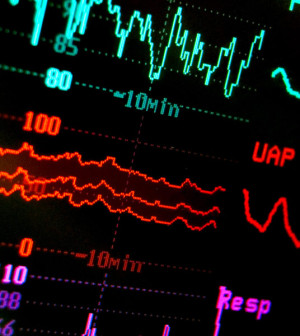- Could Your Grocery Store Meat Be Causing Recurring UTIs?
- Are You Making This Expensive Thermostat Error This Winter?
- Recognizing the Signs of Hypothyroidism
- 10 Strategies to Overcome Insomnia
- Could Artificial Sweeteners Be Aging the Brain Faster?
- Techniques for Soothing Your Nervous System
- Does the Water in Your House Smell Funny? Here’s Why
- Can a Daily Dose of Apple Cider Vinegar Actually Aid Weight Loss?
- 6 Health Beverages That Can Actually Spike Your Blood Sugar
- Treatment Options for Social Anxiety Disorder
Slow Heart Rate Doesn’t Mean Early Death Risk: Study

People with a slow heart rate don’t have an increased risk for heart disease, a new study suggests.
A typical heart rate for an adult at rest is 60 to 100 beats a minute, but in some people it’s below 50 beats a minute, a condition called bradycardia, the researchers said.
Because the heart may not be pumping enough blood throughout the body, this slow heart rate can lead to light-headedness, shortness of breath, fainting or chest pain. However, it hasn’t been clear whether a slow pulse increases the risk of heart disease, according to the study authors.
“For a large majority of people with a heart rate in the 40s or 50s who have no symptoms, the prognosis is very good,” corresponding author Dr. Ajay Dharod, instructor in internal medicine at Wake Forest Baptist Medical Center in Winston-Salem, N.C., said in a center news release.
“Our results should be reassuring for those diagnosed with asymptomatic bradycardia,” Dharod added.
In this study, researchers looked at data from more than 6,700 people. They were between the ages of 45 and 84, and living in the United States. None had heart disease when the study began. Their health was followed for more than 10 years.
People with a heart rate of less than 50 and no symptoms of heart trouble didn’t have a higher risk of heart disease than those with a normal heart rate, researchers said.
However, people with a low heart rate who were taking heart rate-modifying drugs such as beta blockers and calcium channel blockers had an increased risk of death, the study found.
But, the study wasn’t designed to find a cause-and-effect link between these factors, only that there is an association between them.
“Bradycardia may be problematic in people who are taking medications that also slow their heart rate,” Dharod noted. “Further research is needed to determine whether this association is causally linked to heart rate or to the use of these drugs.”
The findings were published online Jan. 19 in the journal JAMA Internal Medicine.
More information
The American Heart Association has more about heart rate.
Source: HealthDay
Copyright © 2026 HealthDay. All rights reserved.










